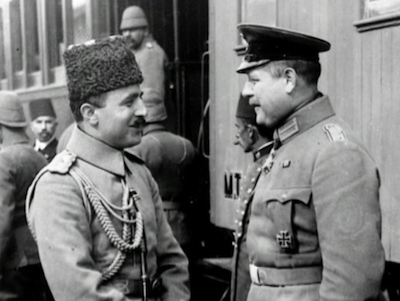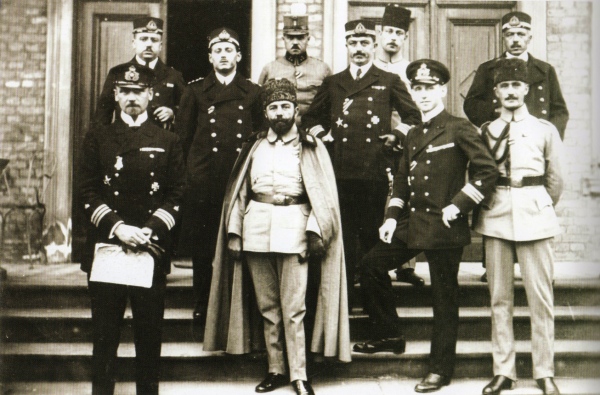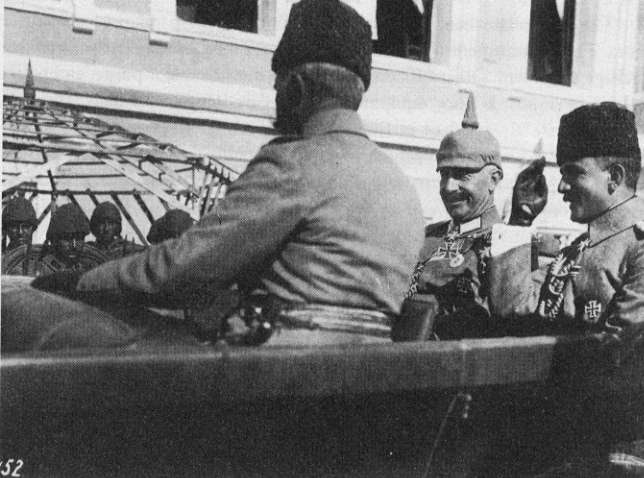On the brink of the First World War, the Ottoman Empire found itself in dire straits. Consecutive wars in this era had led to territorial losses, economic devastation, and a population left disheartened and weary. What the Empire urgently required was an opportunity to recuperate and institute necessary reforms. However, this respite was not forthcoming, as the world was hurtling towards war, and it seemed highly improbable that the Ottoman Empire could remain uninvolved in the impending conflict. Given the infeasibility of maintaining neutrality and concentrating on recovery, the Empire had no choice but to form an alliance with one of the opposing factions. This was a consequence of the Empire being utterly depleted of resources, having insufficient quantities of armaments and machinery remaining, and lacking the financial capacity to acquire new ones. The sole recourse for the Sublime Porte was to establish an alliance with a European power, and initially, the specific choice did not hold significant importance.
"Turkey had to align itself with one of the blocs in order to undertake vital domestic reforms, invigorate its trade and industry, expand its railway networks, and essentially, to endure and safeguard its existence." (Talat Pasha in his memoirs)
The challenge lay in the fact that the European powers were not particularly enthusiastic about forming an alliance with the ailing Ottoman Empire. At the outset of the Turco-Italian War in North Africa, Grand Vizier Sait Halim Pasha had conveyed the government's interest in establishing an alliance, and Turkish diplomats were tasked with gauging the interest of European capitals. It appeared that only Russia displayed some interest, albeit under terms that essentially implied a Russian protectorate over Ottoman territories.

Over time, differing viewpoints emerged within the Ottoman government regarding which group of powers the Empire should approach for an alliance. The majority among the government, the moderates, favoured an alliance with Britain and France, as they perceived these countries as posing the most significant threat to the Empire. In contrast, the extremists saw advantages in aligning with Germany and Austria-Hungary.
The moderates held the belief that Germany and Austria, due to their geographical positioning, did not pose a direct threat, and aligning with the Entente would reduce the peril faced by the Ottoman Empire. The initial diplomatic outreach was directed towards Britain, and this occurred as early as October 1911 when the Minister of Finance, Cavid Bey, informally conveyed the Sublime Porte's desire for an alliance with Britain in a letter to Churchill. Regrettably, the response was negative. A formal approach was made to Britain in 1913 by the Ottoman Ambassador in London, Tevfik Pasha, who presented the government's interest to the British authorities, only to receive a polite but ultimately dismissive response. The British government failed to discern any advantages in forming an alliance with the Ottoman Empire.
Russia was also approached in this endeavor. In May 1914, Talat Pasha and İzzet Pasha embarked on a journey to Crimea to convey the Sultan's greetings to Tsar Nicholas II. On the final day of their visit, Talat Pasha held a meeting with Russian Foreign Minister Sergei Sazonov and conveyed his government's eagerness to establish an alliance with Russia. However, this meeting did not yield any results.

France was another nation with which the government made contact. In July 1914, Cemal Pasha, the Minister of the Navy who concurrently served as the chairman of the Turco-French Friendship Association, was dispatched to Paris to negotiate an alliance. As with previous attempts, this endeavor also met with disappointment. The French side informed Cemal Pasha that they were unwilling to engage in alliance discussions with the Ottoman Empire without Russia's approval. They were reluctant to jeopardize their relationship with Russia, as they deemed it indispensable for countering Germany. In his memoirs, Cemal Pasha expressed the profound disappointment he felt, as he had not anticipated such an outcome.

Having been rejected by the Entente, the Sublime Porte found itself with no alternative but to turn to the Central Powers. The government's extremists, including Enver Pasha himself, were in favour of aligning with Germany, as they believed that Germany possessed the most formidable army in Europe. They held the belief that Germany had no territorial ambitions within the Ottoman Empire, and thus, in comparison to the Entente powers, would pose a lesser threat to the Ottoman Empire if they emerged victorious in the war. They saw an alliance with Germany as a means to potentially safeguard the Empire from disintegration and even enhance its standing in the event of a German victory. Cemal Pasha, who had previously leaned towards an alliance with the Entente, reflected in his memoirs:
"Germany can safeguard its interests only by ensuring the strength of Turkey. Germany is not in a position to subdue Turkey as a colony, as both its geographical limitations and available resources render such an endeavor unfeasible. Hence, Germany is opposed to the partition of Turkey by the Entente powers, as Turkey provides a market that could be connected to its own. The disappearance of Turkey would leave Germany encircled within the steel ring of the Entente. To avert this outcome, Germany must guarantee the preservation of Turkey's territorial integrity." (Cemal Pasha in his memoirs)
By that time, Germany had already established a substantial presence within the Empire. In 1913, a German military mission was assigned the task of restructuring the Ottoman army, and Germany had become deeply engaged in the Ottoman economy. Additionally, the German military leadership recognized the significant strategic value of the Ottoman army's active involvement in the impending conflict.
Nonetheless, the German government displayed reluctance in formalizing a military alliance with the Ottoman Empire. Both the Foreign Ministry in Berlin and the German Embassy in Istanbul held the view that the Ottoman army, due to its inherent weakness, would only prove to be a liability for Germany during the war.
On 22 July 1914, Enver Pasha proposed an alliance to the German Ambassador, Hans von Wangenheim. Initially, the ambassador declined the offer. However, Kaiser Wilhelm, recognizing an opportunity in having Turkey as part of the Central Powers, overruled this decision. Despite the Ottoman army's relative weakness, it still had the potential to create substantial concern for the Entente by launching attacks on British holdings in the Middle East and Russian territories in the Caucasus. The Kaiser's aim was to open additional fronts against the enemy and exploit all available means at their disposal. He instructed Wangenheim to sign the alliance treaty under the condition that the Ottoman Empire would swiftly take action against Russia, which it eventually did. The alliance was formalized on 2 August 1914, even as Germany was already engaged in the war.

The alliance treaty was signed under strict confidentiality, with only five individuals in Turkey privy to its existence. Cavid Bey criticized it, contending that it would subordinate the Empire to German interests. On the contrary, Cemal Pasha, who learned about the treaty a day after its signing, welcomed the Empire's alignment with one of the two major power blocs. Sait Halim Pasha held a more naive perspective, hoping the treaty would enable the Empire to maintain its neutrality in the war, although this expectation was evidently unfounded. In contrast, Talat Pasha and Enver Pasha understood that the document would draw the Ottoman Empire into the war. For Talat, it was a calculated risk, recognizing that they had little chance of staying out of the impending conflict. However, a potential German victory held the promise of rescuing the Empire from the dire straits it was in. For Enver, siding with the Germans also aligned with his aspirations for pan-Turkic objectives in Asia.
At that juncture, the moderates in the government displayed little enthusiasm for taking sides in the war; their primary goal was to exploit the international situation to secure full independence and concentrate on domestic reforms. They aimed to reassure the Entente that the Ottoman Empire would maintain its neutrality. In contrast, the extremists were inclined towards participating in the conflict.
Just a few days after the Turco-German treaty was officially sealed, Enver made a surprising overture to the Russian military attaché in Istanbul, General Leontieff. He proposed a potential Turco-Russian alliance in exchange for the recognition of the Ottoman Empire's independence and a favorable reconfiguration of the Balkan map in its favour. The Russian side did not outright reject the offer, but they refrained from entering into any formal commitment. It remains uncertain whether Enver intended to buy time or genuinely contemplated aligning with Russia and joining the war against the Central Powers.
As the hostilities on the European continent were already underway, there was a contentious debate within the Ottoman government between the moderates and the extremists regarding whether the Ottoman Empire should enter the war or maintain a position of neutrality. In late October 1914, the decision was significantly influenced by a fait accompli: a German admiral, commanding two ships, Goeben and Breslau, sailed them to the Black Sea under the Turkish banner and initiated a bombardment of Russian ports. This decisive action settled the matter.
![]()